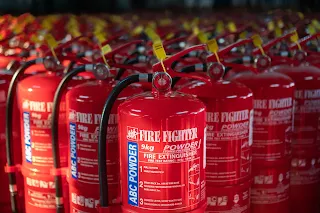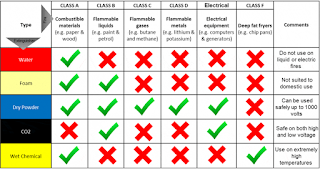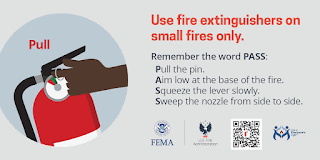Fire Safety
Introduction
A fire can become life-threatening in just 2 minutes. A residence can be engulfed in flames in 5 minutes.
Theory of Fire
Fire is a chemical reaction involving rapid oxidation (burning) of fuel.
- The following 3 elements must be present at the same time in order for a fire to start: oxygen, heat and fuel.
- Hence, remove any one of the 3 components will extinguish a fire.
Fire Extinguishers
The purpose of the fire extinguishers is to prevent a small fire developing into a large one.
NOTE: It is important to verify if the fire extinguisher is in good working order periodically.
Operate a Fire Extinguisher
To use a fire extinguisher, you can follow the PASS method.
- Pull (Pin)
- Pull pin at the top of the extinguisher, breaking the seal. When in place, the pin keeps the handle from being pressed and accidentally operating the extinguisher.
- Immediately test the extinguisher. (Aiming away from the operator) This is to ensure the extinguisher works and also shows the operator how far the stream travels
- Aim
- Approach the fire standing at a safe distance.
- Aim the nozzle or outlet towards the base of the fire in the direction of wind.
- Squeeze
- Squeeze the handles together to discharge the extinguishing agent inside.
- To stop discharge, release the handles.
- Sweep
- Sweep the nozzle from side to side (NOT up and down) as you approach the fire, directing the extinguishing agent at the base of the flames.
Fire Drill Training
A fire drill is a safety procedure that is conducted in order to prepare people for what to do in the event of a fire.
- It is a mandatory requirement for all commercial and public buildings.
During a fire,
- Remember, there is no safe place inside a burning building. The safest place is outside the building.
- Drop down to the floor and crawl low, under any smoke to your exit. Heavy smoke and poisonous gases collect first along the ceiling.
- Before opening a door, feel the doorknob and door. If either is hot, or if there is smoke coming around the door, leave the door closed and use your second way out.
- If you open a door, open it slowly. Be ready to shut it quickly if heavy smoke or fire is present.
- Once evacuate to fire assembly point, never re-enter a burning building.






Comments
Post a Comment